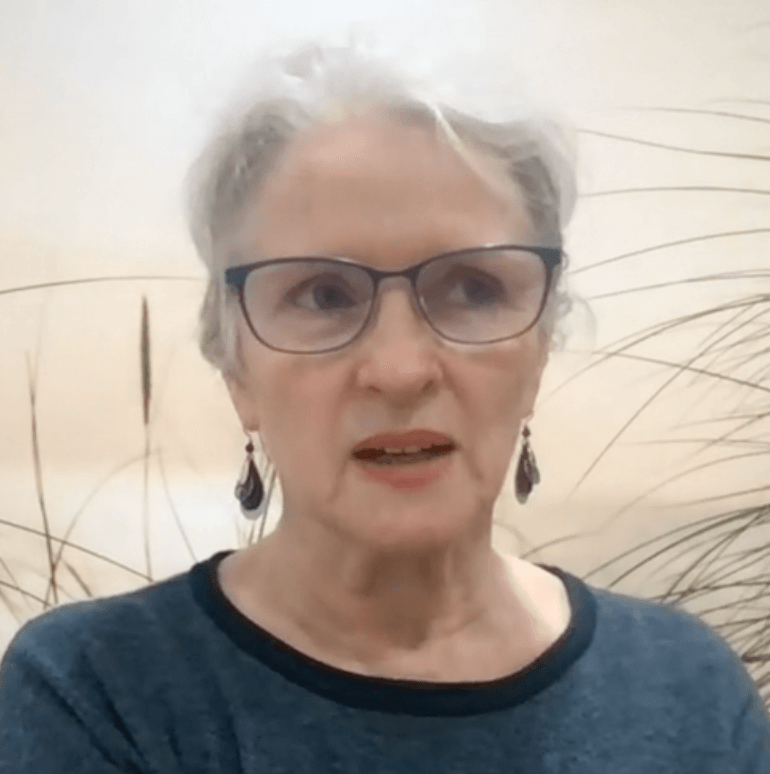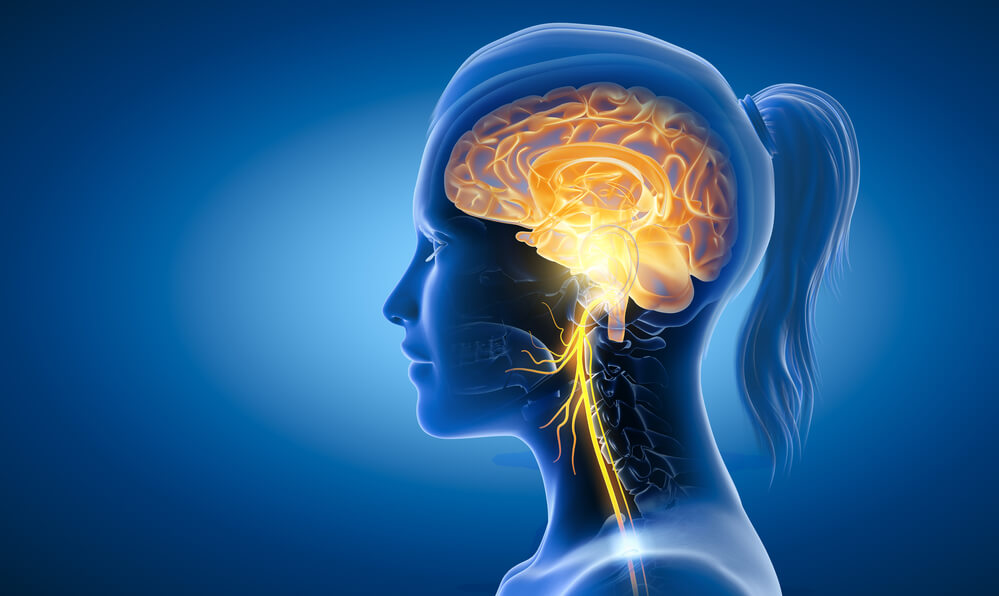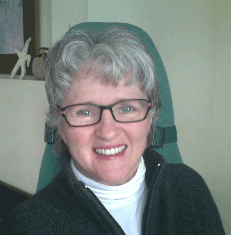In the image above, you have only to look into her eyes to see she's present. There's someone "home".
Becoming more present is all part of nervous system health. The better regulated your nervous system the more resilience you have, the less anxious you are and the more others see you as having presence.
As the receiver, you feel "seen".
By the way, that presence gives you a distinct advantage.

Dr. LaCombe, Rebel Shrink and Psychologist
Updated: July 20, 2024
We're literally triggered all day long, often by innocuous things.
When we're able to "hold" the charge of a big trigger we can more easily remain present to our lives.

The brain and nervous system control our capacity to be present. The good news is that through the power of neuroplasticity, the nervous system can change.
The Quality of Being Present is on a Continuum: Where are you?
Becoming more present is a characteristic of the nervous system that you can actually improve.
I'll have clients who I've seen for a while, spontaneously mention that they feel others take note of them more. The nature of our work is directly impacting the growth of their nervous system.
We might not have chatted about it previously because they naturally mistook that they weren't being assertive enough or perhaps they assumed other's saw their failings.
They might report that others speak over them or see through them as if they weren't there.
In reality, becoming more present actually "fills" you out more. You're now being noticed because there's more of you there to notice.
Being More Present Gives You an Advantage in Life
In a crowded room, there's folks that stand out more than others. With little thought we might casually attribute their status to how they dress or whom they're with. It might be in what they say that gets them noticed.
Truthfully, we're wired quite differently. Who you unconsciously register in your radar is often coming from the energy that person exudes. That "energy" comes in part from the health of their nervous system.
You see when you work from a nervous system perspective, you're actually expanding your capacity. With these changes, there's now more neuropathways that register a presence in you.
One Other Advantage to Being More Present
When your nervous system is better regulated, it means you have more of a capacity to "hold" a charge. In other words, you're less easily triggered.
When you're triggered you feel it immediately in your body. Suddenly, you want to jump out of your skin. You look around for why you're feeling so unsettled.
Each "trigger" event has a different level of arousal what I refer to as a "charge" in your body. Some triggers can send you over the deep end, others are mere nuisances.
The healthier your nervous system, the more likely you can tolerate the discomfort of a trigger. And the less likely to overreact.
In fact, improving your nervous system health is the easiest buffer against any trigger.
Are you being in the moment?
One of the fastest ways - possibly the only way - to engage the brain in changing any behaviour or emotion is to stay in the present moment.
When you reflect back on your day, ask yourself how many "pause moments" have you had. It's generally an indication of how present you are.
Being present means being fully engaged in the moment with all your senses attuned to the here and now. You are neither dreaming of the future nor regretting the past. You are in the moment.
And, being increasingly present to our everyday life is one of the least mentioned yet most beneficial outcomes of psychotherapy that's focused on true change.
An easy definition for being present
Have you ever been in a rush to get somewhere only to arrive, sit down, but not feel as if you are actually there?
It's as if you have physically arrived but your mind is still in the parking lot 🙂
This is what it feels like when you are not present - your mind is too distracted to fully take in the moment.
What you may not know is that your "distracted mind" is being generated by the nervous system. It's because the nervous system being too amped up. It cannot "hold" the energy associated with the activities of your day and now it's "spilling" over.
A "moment" is 1-10 seconds long
Another way of describing presence is via the senses. All five senses are receptive to experience: taste, smell, hearing, touch and sight.
Staying in the present moment also means noticing bodily sensations such as heart rate, your breath, the tightness in your muscles, the state of your gut (i.e., stomach gurgling), and many other body signals we usually ignore.
Dr. Daniel Stern, author of The Present Moment calculates that a present moment is 1-10 seconds long. He explains that being present gives us the richness in life, like those few seconds when we catch a friend's eye in a moment of knowingness.
He says our capacity for being present allows us take in a sunset, catch the scent of a spring flower or perceive the irony in a moment of laugher. It's a full sensory experience.

"No one imagines that a symphony is supposed to improve in quality as it goes along, or that the whole object of playing it is to reach the finale.
The point of music is discovered in every moment of playing and listening to it.
It is the same, I feel, with the greater part of our lives, and if we are unduly absorbed in improving them we may forget altogether to live them."
Alan Watts
How to Improve Your Capacity for Presence
When clients arrive for their appointment and jump into a description of the latest news without first having made solid contact with me (one that contains a feeling of presence), I always draw it to their attention.
I know that unless they are in the moment with me, instead of in their "event", their mind will be less open to change. Venting or emptying out will be just that…a sort of 'spill your beans' session with no opportunity to reset the neuropathways in the brain.
Let's say my client has been talking for a few minutes about a difficult subject. Suddenly she changes the topic. When I respond with, "what just happened?" I am attempting to bring awareness of her actions into the present moment.
I might also deepen the moment by asking what she is feeling inside. In somatic therapy, I would draw attention to what sensations she might be feeling in her body.
And, by the way, in this example, I have interrupted the patterned way that she responds to emotional distress. As you might guess, by drawing her attention to it, I have increased the probability that she might recognize this in future.
But not only that, by interrupting this patterned response there's now a greater chance that the nervous system will respond differently next time.
Being present "interrupts the procedure".
For much of our day our patterned behaviours are pretty much as the day before...personal hygiene, preparing meals, going off to work, meeting in the lunch room, coming home, watching television. We give little thought to them, we do them automatically.
Present moments interrupt these automatic behaviours. Present moments allow us to drink in life. They give us a presence of mind. As Dr. Scaer author of The Trauma Spectrum explains, "the mind exists in the present moment."
Are you a verbal discharger?
Do you find yourself moving quickly from one story to another in your conversations with friends or with your therapist in your psychotherapy sessions?
You may not even realize you're doing it.
Possibly a few concerned friends might have mentioned it in passing that "it's hard to get a word in edgewise".
Maybe you realize it has happened and yet you feel at a loss on how to change. You usually feel swept up in the moment and you don't realize until the time has passed that you've done it again.
You see, non-stop talking is an unconscious way to release your nervous system energy.
You're attempting to regulate your nervous system by discharging through talk.
You Need to Be Present to Change the Brain
If that's the case it's unlikely that you're using the power of the present moment in your therapy.
Bottom line, you can't take in what counseling has to offer unless you're there to take advantage of it.
Staying in the present means you are giving yourself plenty of time to process how and what you're saying and bringing your feelings associated into the present.
That means you need to STOP and be in the emotions that are bubbling up.
Even better check into your body and sense what's going on (all emotions are experienced through the body - whether you can feel anything or not.)
The present moment connundrum
When it is brought to our attention most people recognize the difference between being present and not being present. (Like someone suddenly pulls you out of a trance.)
However, it's often hard to catch ourselves in the act of not being present.
Rule of thumb: the less we're in the present - in our body - the less likely we'll be drawn to notice when we're not present.
Easiest way to improve your presence
The fastest way to being present is by checking into your body. When you pause to sense sensations, little movements or feelings, you're actually bringing yourself into the present.
You may have come across my FREE eBook, the 12-Second Chill. In it I give you tips for how to be in your body. Not only does it help to bring you to the present it has a multitude of benefits when done repeatedly.
Change only happens in the present
It's only when we attend to a stimulus in the present moment that neurons fire and neuronal alteration is possible.
So if I talk about a recent argument with my husband far removed from any feelings or bodily sensations associated with that event, I am less likely to create a change in my brain.
In other words, when you are fully in the moment 'all cylinders are firing'. Both sides of your brain, the left and the right are in the 'on' position. That means there will be a greater probability that old neural patterns, and thus old behaviors, will be altered or overpowered by new ones.
My Personal Musings
My own counseling has largely been responsible for my growing capacity (and craving) for more present moments. With each year that passes I feel I am more conscious, more aware. In any given moment (at least most of the time!) I am able to take in more information which naturally improves the decisions I make and adds color and depth to my life.
Reviewed by: Dr. Carole Gaato
References
Scaer, Rober, C. (2005). The Trauma Spectrum. New York: W.W. Norton & Company.
Siegel, Daniel J. (2007) The Mindful Brain: Reflection and attunement in the cultivation of well-being. New York: W.W. Norton and Company.
Stern, Daniel (2004). The Present Moment in Psychotherapy and Everyday Life. New York: W.W. Norton & Company.
related topics
Fosha, Diana (2000). The Transforming Power of Affect : A Model for Accelerated Change. Behavioral Sciences Research Press.
While Dr. Fosha only writes of the therapist's presence, many of her case examples call for presence on the part of the client in the way we have described above.
A Good Read
NPR has compiled a wonderful collection of essays from Americans who are hopeful about the future and wish to share their beliefs. The story below is from a piece I found personally heartwarming. It's from a psychologist who describes her experience with 'presence' both with close friends in need and in her work as a volunteer for the Red Cross.
You'll get a much deeper understanding of the concept of 'being present' when you read her story. (You will be taken off site.)
Bearing witness: the power of presence
Reader comments about being present

Christine
I fight it instead of feeling it.
I am grateful to hear the way you explain being in the present. I know that I do this better when another person is with me and interacting. I have several frustrations related to transference (deeply attached to my therapist of 2 12 years).
I'm so sad all the time because I wish for a relationship that I can't have. I am so left-brained I can stay away from now and theorize for hours. I desperately want to get through this pain. This feels so much like real life that I ruminate on it almost constantly. This is not good for my marriage or my relationships with my children. I fight it instead of feeling it.
I'm working on my grad degree in counseling so I really want to learn from this and move on. When I do feel the loss of this dreamed up relationship, the sadness seems overwhelming. It's not like mourning a real death and I can't just breakdown for a week. Only my therapist would understand, but my family just worries about me.
Christine

Shrinklady
I'm sorry to hear Christine how therapy is going for you. Yeah, transference can be brutal....especially going through something where you don't feel you have much control over.
On the plus side, I'm very pleased you're in training to be a therapist. That's awesome. This work will definitely help to define your work.
I was also pleased that you seemed aware how being "left-brained" might be holding things up for you. Yes, left-brain types tend to have an easier time in school but then, it can also make therapy doubly hard.
However, the good news is that in doing your therapy, you should end up feeling more balanced with the right brain.
Christine, this might be helpful as it's one of things I teach in my program...and it might sound counter-intuitive...if you were to allow yourself to enjoy the feelings of loving your therapist i.e. in contrast to noticing what you don't have...it might be enough to help you move through the transference more easily.
If you give it a try, let me know how it goes.
All the best,
Shrinklady

Debbie
My talking brain appears to be the only part of me that's alive
Hi Shrinklady, I beginning to realise that I may have been disassociative all my life. I have lived with constant fear and shyness since a tiny child. In my adult life I have tried to combat this and can sometimes put on a very thin veil of normalcy. But most times people see through this and it causes them to dislike me a lot of the time - maybe they think I'm fake? Nothing makes me 'feel' anything. I feel a continuous flatness.
Hours and days drift by where I get nothing of worth done. I have felt suicidal in the past but am even beyond this now in the haze that I live in - it would take too much effort to end it all. I have lost all creativity and joy.
My dogs used to be the one safe emotional place I could retreat to, but now even they are moving beyond the veil into the numb place. I know they see this as their moods have become quite flat too. They miss me, I know. 🙁
Everything has become confusing and my sleep is constantly disjointed and interrupted - sometimes I sleep 2 hours then wake for 4 hours then 2 hours more sleep. Sometimes I sleep 5 hours then awake till the next night, then 3 hours sleep then 5 hours awake etc.
I can no longer work as I am constantly exhausted and even the tiniest bit of stress is intolerable to me - like a silent bomb going off in my head and I have to remove myself from the situation. I am in the UK and we don't seem to have therapists that specialise in anything but 'talk about it and it will go away' therapy. I've tried that and although I did work through issues relating to my father it has not helped with this ongoing zombie like state I am forced to endure.
I remember very very few things from childhood and my early life and my memory seems to be broken. I can watch a film and the next day not be able to really remember what it was about. It's very distressing. 🙁
My talking brain appears to be the only part of me that's alive - it appears totally distinct from my physical body - almost as if I live in my head and my body is somebody elses.
I'm sorry for the long rambling outpouring but to be honest there are pages and pages of things that are wrong but I know you can't help me so there is no point taking up even more of your time.
I have found it very interesting to read other people's experiences here though. I'm glad to think that maybe I'm not totally crazy, which was what I was beginning to think.
Debbie (Yorkshire, UK)

Christine
Take care of your issues while you can
I am old now - 65 have seen therapists and end up dreaming while i've felt their ( only 5 mins left and i've earned my £40). i know my hurts and abuse i've had and play it all like tapes over and over, and the abuse continues. reading all this - just by chance really has opend some windows in my thinking, but still at bottom of mountain. very hard to climb out.
calm flat pleasing lots of people and don't know who i really am.........somewhere inside i grieve for the hurt child who is alone against the world.
I just read the 'end' and its ok i don't need a reasponse, perhaps younger person will see someone like me and try to solve their issues before life has passed by x
christine (SALISBURY, ENGLAND)

Shrinklady
Thank-you for taking the time to post and to think of others when you are suffering. Please take care of that little girl inside you...she needs your love.
Shrinklady

Jean
Can't break the habit. (rural Washington State)
I remember as a child I lived in the present. I was attuned to nature and people. But then I started fantasising and now it's such a habit. When I try to stay in the present, I find myself drifting into fantasy land again.
I really want to stop but it seems it's such a habit and I can't break it. I also think about the past alot and am worried about the future but I draw myself to the present and get relief knowing that "now" is safe.
I just want to turn off the fantasy habit. Thanks
Jean

Bryn
How can I heal and still hold onto the relationship?
It has become very apparent recently that i don't trust my partner when he is away from me. I don't mean like a couple of hours but when he takes 2 or 3 day trips into the city. It has come to the point where i am awake all night with anxiety and tightness in my chest worrying about 'what he's upto' and specifically 'who with'.
I am realizing i have intensely strong abandonment issues coming to the surface and im scared they are going to ruin a otherwise healthy relationship.
How do i stay open to my process of healing these issues, in relationship, without sacrificing a good thing. I'm beginning to feel he might not have the patience or understanding to work it out but i don't want to cling. Not so appealing!
Bryn (Vancouver, Canada)

William
Can't stay in the moment after quitting weed
I have trouble finding the present moment since I have stopped smoking weed on a regular base. My parents divorce in 2002 and since then my addiction to marijuana was very high. I guess I didn't want to accept the fact that they were not together anymore.
Also, I lost four school years because of that. Except, I quit smoking for a year now and I have trouble finding the present moment. I am going 22 in august and I don't know what I have.
William (quebec, canada)

Nancy
Not making progress in therapy
I know I need to "get in touch with myself". As you describe, my mind is still in the parking lot.
That is exactly how I feel when I arrive for therapy. I have been racing around trying to take care of others, then do my job and my mind is still full speed ahead mode when I arrive. I talk about work or my concern about my family. There is no slowdown, no pause. I am functioning on the same level in therapy as when I first woke up that morning.
People think I am very strong, but its easy to be strong when nothing sinks in. I divorced my second husband about a year ago and I hadn't really grieved the end of our relationship or the fact that 2 of my children (first marriage) were diagnosed with bpd just before the divorce. I have been busy proving we would be fine. It wasn't until my ex-husband was accidentally killed recently that the loss of the relationship came rushing in.
I know I am flatlining. I am not there during therapy to make any progress. I am strongly considering finding another therapist. She was a wonderful help through marriage counseling and divorce, and it scares me to think of ending the relationship, but I have been seeing her over a year with little change. I don't think I would feel safe opening up to her now, even if I were in that frame of mind. If she made a negative comment to something I decided to share, I would be destroyed. I would like to see life in full color.
Nancy

Helen
I stepped back and allowed myself to feel hurt
Mary's comments and and your response, Shrinklady, spoke to me. I can relate to what Mary calls flatness. My husband (a recovering alcoholic) tells me that I have a limited range of emotions, and I am just beginning to see why this is so. It is hard to feel things when I've become such an expert at turning off the emotions (unconsciously). I am in therapy (childhood trauma) with a kind PsyD who explains things much like you do, Shrinklady.
A hurtful situation occured today and instead of being my usual Scarlet O'Hara (in GONE WITH THE WIND), I caught myself turning off my hurt feelings. (in the final scene - she says "I'll think about this tomorrow"). This is how I've always dealt with hurt, block it out, don't feel, don't process. Today was different- I stepped back and allowed myself to feel hurt. Not a good feeling, but certainly the awareness was an AH-HA moment. I think this is what you are talking about by being present, yes?
Helen (NJ, USA)

Shrinklady
Wow, Helen, that's a terrific example. Yes, exactly. You became present to your feelings.
I know there's pain in this journey yet I'm really happy for you. As I described above, in time, your nervous system will learn to manage a wider range of emotion. And even though it starts out with pain, as this journey unfolds, I know that you will find more joy. Scarlet O'Hara no more!
All the best on your journey Helen,
Shrinklady

Mary
Now I'm in a great relationship and still feel nothing
This is the first site that I have found that explains my "flatness". I was married at 20 to a man with, what I finally found out was bpd. I divorced him after 35 years. Our son is an alcoholic. I was his worst enabler. Now I'm in a great relationship and still feel nothing.
I am trying to find out how to heal myself. I hold a managerial job at which I am very good, am on Paxil, and only feel "feelings" in relationship to animals, esp. my dog. What to do. HYTSZ
mary (madison, usa)

Shrinklady
Hello Mary, I can appreciate the challenge you face. I started from the same place i.e. being able to feel only for my dog, Lady. As you know, the "flatness" you experience is a common reaction to being traumatically hurt. It's a way to contain the underlying emotional charge.
My guess is that your troubles didn't start just with your ex-husband with BPD. The fact that you gravitated to him and didn't see the red flags suggests that you weren't very present at the time you met him. This is how being more present in our lives aids us. It helps us to reflect on our lives because it knits together experiences that are being lived in the moment.
In order for you to continue your healing, you'll need a safe relationship similar to the one you have with your pet. That's why you are able to feel for your pet, because it's safe.
We learn to feel through relationships no matter if they be our pets, our friends or our partners. We all affect each other and the more significant the relationship the more its potential for being an agent of change. This might mean taking emotional risks with your current partner and being increasingly honest about yourself.
Many folks find however that their emotional baggage impacts their relationships making it difficult to find the depth of safety required. For this reason, I believe therapy is a better alternative to healing. Because of its unique boundaries, it is usually a safer relationship than with our chosen partner. And, with the right therapist, therapy speeds up the process of healing. The benefits will inevitably spill over into your relationship with your partner making it stronger and more fulfilling.
A good therapist can also help you experience the present, bringing awareness to the here and now. As you may have guessed reading the article above, the more emotional baggage we're carrying around the less we tend to experience the present. But it's the present moment that gives us the quality in our lives. This is also what we believe is needed to change how your brain responds in relationships.
As you feel better, your therapist can also help you come off Paxil. Whenever your nervous system is dealing with an antidepressant, it's harder for it to learn new ways of being. Paxil restricts your range of affect--that's its job. However, you need this range so your nervous system can learn to tolerate different emotions--both the good and not-so-good.
All the best Mary on your healing journey,
Shrinklady

